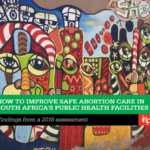The objective of this study was to estimate the costs of public-sector abortion provision in South Africa and to explore the potential for expanding access at reduced cost by changing the mix of technologies used. It concludes that South Africa can provide more safe abortions for less money in the public sector through shifting the methods provided–and says that more research is needed to understand whether the cost of expanding access could be offset by savings from averting costs of managing unsafe abortions.
This analysis aimed to estimate the costs and cost- effectiveness of providing first-trimester medication abortion and manual vacuum aspiration (MVA) services to inform planning for first-trimester service provision in South Africa and similar settings. It found that the cost per complete medication abortion was lower than the cost per complete MVA. This analysis supports the scale-up of medication abortion alongside existing MVA services in South Africa. Women can be offered a choice of methods, including medication abortion with MVA as a back-up, without increasing costs.
Contraception is an essential element of high-quality abortion care. However, women seeking abortion often leave health facilities without receiving contraceptive counselling or methods, increasing their risk of unintended pregnancy. This paper describes contraceptive uptake in 319,385 women seeking abortion in 2,326 public-sector health facilities in eight African and Asian countries. Ministries of Health integrated contraceptive and abortion services, with technical assistance from Ipas. Overall, postabortion contraceptive uptake was 73 percent. The findings demonstrate high contraceptive uptake when it is delivered at the time of the abortion, a wide range of contraceptive commodities is available, and ongoing monitoring of services occurs.
The importance of South Africa as a model for reproductive self-determination in Africa cannot be underestimated. Abortion has been legal since 1996, and the country has some of the most developed government systems for the provision of abortion care on the continent. Yet in the same way opponents of abortion in the United States have whittled away at access with increased bureaucracy, South Africa faces similar assaults that leave women without safe care and threaten to turn back achievements made during the past 16 years. This article explores the history of the law, subsequent legal challenges, and new threats to women’s access to abortion services, including service delivery issues that may influence the future of public health in the country.

Despite the fact that abortion is legal in South Africa under a range of circumstances and available in public health facilities throughout the country, many women and girls continue to seek clandestine, unsafe abortions that put their health and lives at risk. To ensure well-informed program design and solid support and engagement from program stakeholders and beneficiaries, Ipas conducted a strategic assessment on abortion in Limpopo and Gauteng Provinces in 2018. Three factsheets contained here present recommendations and key findings compiled from various information-gathering methods used in our assessment.


